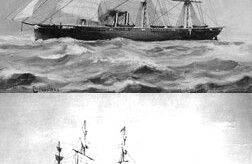Two ships meet in the middle of the Atlantic Ocean, each carrying 2,500 miles of telegraph cable. The cable is spliced together and the ships set off in opposite directions at an average speed of ten knots. It sounds like an artifact from freshman algebra, likely to play out only on paper, but crewmen from the USS Niagara and the HMS Agamemnon attempted this technical marvel on the high seas in 1858. Though initial efforts would fail, their perseverance spawned a new era of globalization.
The trans-Atlantic telegraph cable was the brainchild of Cyrus Field, a New York businessman who sought to expand commercial opportunities between Europe and the Americas. Field anticipated the impact that his cable would have on trade and technology. "What God has joined together, let no man put asunder," he declared.
Despite its promise, the first great wave of economic globalization didn't last. The global markets that the trans-Atlantic cable helped create reached their peak in the first decade of the 1900s. According to Harvard University historian Niall Ferguson, "From around 1870 until World War I, the world economy thrived in ways that look familiar today." Trade was plentiful, markets and borders were open. But Europe consumed itself during World War I, and its economies turned increasingly to protectionism. Inflation, hyper-inflation, recession, and depression followed.
In the late 20th century, a similar wave of technological advances and a renewed confidence in trade sparked the current era of globalization. Now, some are asking whether globalization has once again peaked.
"The bad news of the 21st century is that globalization has a significant dark side," write Steven Weber, Naazneen Barma, Matthew Kroenig, and Ely Ratner in a recent issue of Foreign Policy. "The container ships that carry manufactured Chinese goods to and from the United States also carry drugs. The airplanes that fly passengers nonstop from New York to Singapore also transport infectious diseases. And the Internet has proved just as adept at spreading deadly, extremist ideologies as it has ecommerce."
From Russia to Venezuela, governments appear to be turning their backs on open markets, economic liberalization, and foreign investment. The socialist administration of Bolivian President Evo Morales has announced plans to force foreign investors to divest their Bolivian assets. In Thailand, the military-backed regime has placed restrictions on foreign ownership of Thai companies. Perceived threats to national security have scuttled bids from China and Dubai for ownership of U.S. companies.
These trends have led Rawi Abdelal and Adam Segal to ask whether globalization may be in decline. Writing in Foreign Affairs, Abdelal and Segal predict "the idea of unrestrained globalization will wane in force." Globalization will likely continue to "sputter along," but it will do so without the air of inevitability that has been its hallmark.
"Economic processes rarely run in one direction all the time," counters Daniel Altman in the International Herald Tribune (Jan. 9, 2007). The current climate, he claims, is comparable to the volatility of the business cycle. "When you consider the idiosyncratic events that can push globalization along—new technologies, changes in regulations, shifts in consumer preferences—it would be very strange indeed if the overall trend didn't move in fits and starts."
Cyrus Field understood this very well. His trans-Atlantic cable decreased the time it took to send a message between New York and London from two weeks to several hours. But the project was repeatedly put asunder by technical problems, war, and lack of interest. Permanent, uninterrupted, worldwide telegraphic service was not established until 1902, 44 years after the daring, mid-Atlantic rendezvous between the Niagara and the Agamemnon.
Although World War I rolled back many of globalization's advances, the international communication network survived. Field's cable provided the platform for the technological progression from dot-dot-dash to dotcom. Over the past 25 years, benefits derived from the maturation of instantaneous, global communications networks have accrued exponentially. Global life expectancy, literacy and access to clean water have all increased, while infant mortality, child labor and income inequality have fallen.
"To understand the scale of this progress, imagine taking the entire population of the European Union and moving it from subsistence farming to a middle-class lifestyle," writes Altman.
For some, globalization has undoubtedly had a negative impact. Globalization's proponents often compare the phenomenon to a "rising tide," lifting all boats. In some places, however, this tide has seemed more like a tidal wave, dashing all but the sturdiest ships against the rocks.
"It's not some kind of permanent phenomenon," says Trevor Manuel, South Africa's finance minister. "The thing about globalization is that if you blink, you miss it entirely."





